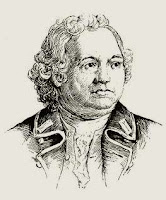 After Gen. George Washington organized the Continental Army into brigades in late July 1775, Gen. Israel Putnam moved into the Ralph Inman mansion in east Cambridge. He had already stationed his son Daniel there with instructions to see that Elizabeth (Murray Campbell Smith) Inman wasn’t harassed.
After Gen. George Washington organized the Continental Army into brigades in late July 1775, Gen. Israel Putnam moved into the Ralph Inman mansion in east Cambridge. He had already stationed his son Daniel there with instructions to see that Elizabeth (Murray Campbell Smith) Inman wasn’t harassed.Soon, however, Inman moved to the estate she had inherited in Milton, and the army finished filling her Cambridge farm with barracks and fortifications. At some point Gen. Putnam’s wife Deborah joined him, as shown by some letters he exchanged with the Cambridge committee of safety in 1776.
After leaving Massachusetts, on 22 May Putnam sent back a letter that “remonstrated against the treatment that Mrs. Putnam had received from an agent of this committee.” The only surviving excerpt, probably with its spelling and punctuation cleaned up, offers a sense of that letter’s tone:
Pray did not I labor and toil night and day, through wet and cold, and venture my life in the high places of the field, for the safety of my country, and the town of Cambridge in particular? For it was thought we could never hold Cambridge, and that we had better quit it, and go back and fortify on the heights of Brookline. I always told them we must hold Cambridge; and pray did not I take possession of Prospect Hill the very night after the fight on Bunker Hill, without having any orders from any person? And was not I the only general officer that tarried there? The taking of said hill I never could obtain leave for before, which is allowed by the best judges was the salvation of Cambridge, if not of the country.On 18 June the committee replied that Putnam’s conduct
while in Cambridge, in every respect, and more especially as a general, (without having it set forth,) we hold in the highest veneration, and ever shall. . . .Richard Frothingham quoted from those letters in his History of the Siege of Boston, thanking “J. Harlow, Esq.” for a look at the original documents. As a historian he was mostly interested in the question of what role Putnam played in the Battle of Bunker Hill. Frothingham avoided stating why the general had complained to the committee about “the treatment that Mrs. Putnam had received.”
Nothing was ever aimed at treating you or yours unbecoming the many obligations that we are under for the extraordinary services you have done to this town, which must always be acknowledged with the highest gratitude, not only by us, but by rising generations.
The best evidence we have about the root of that conflict, and it’s a tradition without a cited source, appears in Old Cambridge and New by local historian Thomas C. Amory, published in 1871. He wrote that:
Mrs. Putnam took her airings in the [Inman] family coach. The Cambridge selectmen, provoked at this by them unwarranted appropriation of confiscated property, had the presumption, when she was some distance from home, to compel her to alight. The general was not of a temper to submit very meekly to such an affront, and his indignation was expressed with sufficient force to have become historical.That appears to be based on local memory rather than documents. It mixes up the selectmen and the committee of safety (though they probably overlapped). But the fact that Frothingham saw letters referring to a dispute means something serious must have happened.
It’s conceivable that Deborah Putnam tried to take the coach not for “airings” but for her journey south at the end of the siege. That could explain why the general wrote back to the committee rather than storm into their meeting-place and cuss them out, which would be more his style. It also fits the legal issues involved: Patriot committees were happy to let the army use local Loyalists’ property during the siege but didn’t want it permanently removed or damaged without legal authorization.
No comments:
Post a Comment